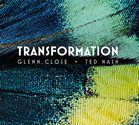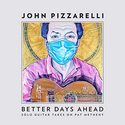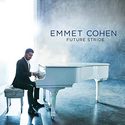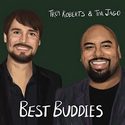|
And now for something different. Normally, we're all about recordings with singers here. But sometimes things are sent to us that are absent of vocalists, but tracks still inspire interest due to the track record of parties involved. It could be someone who usually sings or an instrumental release by someone who had impressed as a singer's accompanist, or it may just be a song title or two that's familiar. You'll hear voices on the first music-filled item ... but they're only speaking.
 TRANSFORMATION TRANSFORMATION
GLENN CLOSE, TED NASH
[AND OTHERS]
Tiger Turn
CD and digital
The theme of change ties together a change-of-pace item for our column. Transformation is a collection of original instrumental pieces, many woven around spoken material, addressing such topics as environmental change, evolving attitudes needed to combat prejudice, and personal growth. Recorded live, it features the compositions, conducting, and soprano saxophone playing of long-careered Ted Nash, joined by 15 other musicians (the well-known trumpeter Wynton Marsalis among them) and spoken word performers. One of the latter, getting billing above him even though she's only heard on three of the 11 tracks, is co-curator Glenn Close, who brings particular gravitas to the collection. Of particular interest to theatre fans is an excerpt from the play Angels in America, one of two tracks she shares with Wayne Brady. Her delivery is crisp, she may seem a bit "grand" when lobbing statements on gargantuan stuff like the "Creation" of the world, but there's almost always a sense of command and an intention to grab your deserved attention.
Throughout the project, the music is dramatic, evocative and emotional, rooted in jazz. Nash has a varied recorded oeuvre that has recently included Presidential Suite which similarly features speech, with one track presenting Close, and a full album of music from West Side Story. The spoken and the instrumental elements of Transformation are complementary, not competitive, seemingly ideal "co-stars," music being more understated when words are gentler and introspective or just need more concentrated attention. In the selections that are purely instrumental, there's more fire and free rein. One such piece, "Forgiveness," is appropriately cathartic but also engaging on its own terms. Either way, things are often quite intense—whether explosive or with a low-burner tautness of simmering heavy thoughts and feelings. Much feels life-affirming.
Amy Irving offers a kind of big anthropology overview of humankind's development and damage done ("Wisdom of the Humanities") as well as one woman's poignant experience being "One Among Many" roaming free in the world after years of incarceration.
A personal moment for the maestro comes with "Dear Dad," the inclusion of an actual letter written to him by his adult trans son, opening up about his perceptions and perspective. Now, several years hence, Eli Nash took the stage to read it, and dad uses his saxophone, composing talent, and heart to provide a potent "Response." Also effectively sharing their own work, on topics related to prejudice, are Wayne Brady—with anger flaring and ebbing (including some rough vocabulary), reflecting on his struggles with self-image—and Matthew Stevenson, who in "Rising Out of Hatred," tells of encountering an old college acquaintance who'd become a neo-Nazi.
For those looking for a serving of thought-provoking, earnest dramatic pieces, Transformation fits the bill. And while such things might not lend themselves to very frequent plays, the dimension and density of the partnered music makes the listening experience richer in initial and follow-up listenings.
 JOHN PIZZARELLI JOHN PIZZARELLI
BETTER DAYS AHEAD
SOLO GUITAR TAKES ON PAT METHENY
Ghostlight Deluxe
It's understandable that many think of the multi-talented John Pizzarelli first as a carefree, full-of-fun fellow. Lively singing and self-accompaniment on guitar with personality, pizzazz and power are strong suits; his humor and joie de vivre are evident in his stage banter and the comments and quips as co-host of the long-running radio show called "Radio Deluxe." Although his sets, live and recorded, can show him as no slouch in sincerely crooning a ballad—and he's logged frequent flyer miles soaring as an instrumentalist—his latest release surprises as a low-key all-instrumental effort. Dedicated entirely to the oeuvre of a veteran guitarist/composer he's long admired, Better Days Ahead: Solo Guitar Takes on Pat Metheny is tasteful, tame and tender. Developed and recorded during a time of sadness and reflection, the graceful effort feels especially contemplative and mega-mellow in the deep bow to the 20-time Grammy winner.
A few things were written in collaboration with bandmate of many years Lyle Mays, who passed away last year. One of those little gems is "James," a dedication to James Taylor. It's perhaps an obvious choice among the many possibilities since Pizzarelli has been part of a few of Taylor's recording projects. And while we are denied hearing Alison Riley's lyric to "From This Place," which Metheny composed in shocked dismay hours after Donald Trump was elected, its combination of desolation and determination comes through.
Many of Metheny's original versions were with a band, with plenty going on, so these stripped-down solo interpretations getting to the barer bones feel especially intimate and pensive. Having 13 such tracks may be an overwhelming number of scoops of very similar flavors of delicious, smooth ice cream that starts to melt together, but it's a pleasure nonetheless to linger long in the relaxed, rarified zone created. Side effects resulting from the musical hypnosis may be drifting and dreaming. Not that there's anything wrong with that! But a more satisfying reaction can lie in listening more astutely to details, pulled in by the in-the-moment playing as phrase follows phrase and music is massaged. This is gentle but genial stuff. John Pizzarelli may not be singing here, but he makes his guitar sing, even with the most subtle tunes that resist sweep and grandeur.
There's another dose of the title song of Better Days Ahead ahead for this piece that premiered back in 1989, as it also provides the title of Metheny's own September release when he revisits this number with the hopeful name. The Pizzarelli version is invitingly luminous and more assertive than many other entries here. And certainly "Better Days Ahead" is a relevant prediction we long to depend on coming true these worrisome days. Meanwhile, we can aim to rest (re)assured, aided by releases like this one that wrap around us like a much-needed warm blanket.
 EMMET COHEN EMMET COHEN
FUTURE STRIDE
Mack Avenue Music Group
Lucky is the music lover who has heard the terrific young lion of a pianist named Emmet Cohen. Some have found him through his recordings with peers and senior legends of jazz or as accomplished accompanist to singers Veronica Swift and Anais Reno, while others have enjoyed the prolific performer live (he's embarked on a tour that will take him to several European countries this fall, following gigs in the U.S.) or weekly concerts beamed from his Manhattan home during the pandemic. Future Stride is his charismatic new release, ten sparkling tracks that display his versatility and panache handling established material and showcase his talent as a composer, too.
He's accompanied by Russell Hall on acoustic bass and Kyle Pool on drums. The latter, who is his composing collaborator on the adorably spiffy title track, is only absent for the 10-track collection's shortest foray, the delightful Duke Ellington entry "Pitter Panther Patter." On other Cohen originals, the party is joined by trumpeter Marquis Hill (on four of them) and sax player Melissa (on three). While all serve the music well, especially with their teamwork workout on the original "Toast to Lo," it's still the guy on the keys who is the undisputed star. He projects an "old soul" who really loves and "gets" the vintage material and can respectfully refresh it and then follow up with his own bright, tight creations.
Especially in the first half of a six-minutes-plus rendition of Jimmy Van Heusen and Sammy Cahn's "The Second Time Around," the 1960 ballad is gifted with the most delicate and thoughtful handling you can imagine. The sprightly senior citizen of the set is a cute concoction that was a number one hit for several weeks 101 years ago: "Dardanella." Just a bit shorter in the tooth is "My Heart Stood Still," the 1927 Rodgers & Hart show tune (used in two shows that year, actually—one in England and one on Broadway). Cohen and company offer a lighthearted, lightly swinging treatment devoid of any sentimentality, the drums standing in for the revived brisk heartbeat. I would be curious to hear how they might take on this flexible standard as a straightforward romantic declaration, too—my wish list bonus track. The dreamy "Little Angel" (another Cohen original) suggests they have it in them.
I began by saying that those who encounter Mr. Cohen are lucky, but it's also the songs that are lucky to be treated with the kind of loving care and imagination they receive.
 TROY ROBERTS and TIM JAGO TROY ROBERTS and TIM JAGO
BEST BUDDIES
Toy Robot Music
Digital
If you have a fondness for detective work and architecture, as applied to music, a strong new instrumental jazz recording called Best Buddies will be of interest. Reading publicity stating that its nine original compositions are all based on/inspired by chord changes and structures of established melodies, including standards and show tunes, piqued my interest. With two Cole Porter classics ("My Heart Belongs to Daddy" and "What Is This Thing Called Love?") and the evergreens "My Shining Hour" and "Angel Eyes" among the starting points, I'm all ears and taking the bait. Well, that "groundwork" may provide solid building blocks, but they don't dominate what we hear by jumping out at us. What's created on top of and surrounding the genesis is prominent and potent at center stage. Saxophonist Troy Roberts and guitarist Tim Jago lead the charge, joined by Karl Florisson on acoustic bass and Ben Vanderwal on drums.
The four players, all natives of Australia (where the recording was made), share creation credit for the briefest of the nine tracks, the "Night in Tunisia"-sparked "Zeena," while all others were composed solely by either Roberts (five) or Jago (three). Somewhat surprisingly, there's no text in the physical CD's package to acknowledge the titles or writers of the forefathers of the selections or even the general concept. That seems wrong to me. Some who blithely buy Best Buddies because they're fans of these players, but not well versed in older repertoire, may not notice the heavily costumed elephants in the room. But certainly the tracks stand on their own merits.
The playing is sterling, whether in ensemble passages or solo spotlights. There's variety in tempi and style, allowing for some attractive ballad work and high-energy races, and tracks that allow for some lengthy exploratory meandering that may not be as compelling. This could be a harder sell for the jazz-resistant listener, but those who appreciate the teamwork of insinuating sax lines, nimble guitar runs, and the added muscle of bass and drums will find rewards aplenty.
Some titles have sly references to the ancestries, such as "A New Porpoise" as a nod to "On Green Dolphin Street" and the switcheroo of two words' initial sounds for the choice of "Chythm Ranges" instead of "Rhythm Changes," which is the informal title used for many examples over the years for new works and improvisations based on the chord changes for the Gershwin classic "I Got Rhythm." Those are two of the Jago-written works, but his "best buddy" has his fun mixing and morphing words, too, which you can see when a guy named Troy Roberts names his record label Toy Robot. At its best, Best Buddies can be like the welcome good company of a new acquaintance who might vaguely remind you of an old friend.
|
|